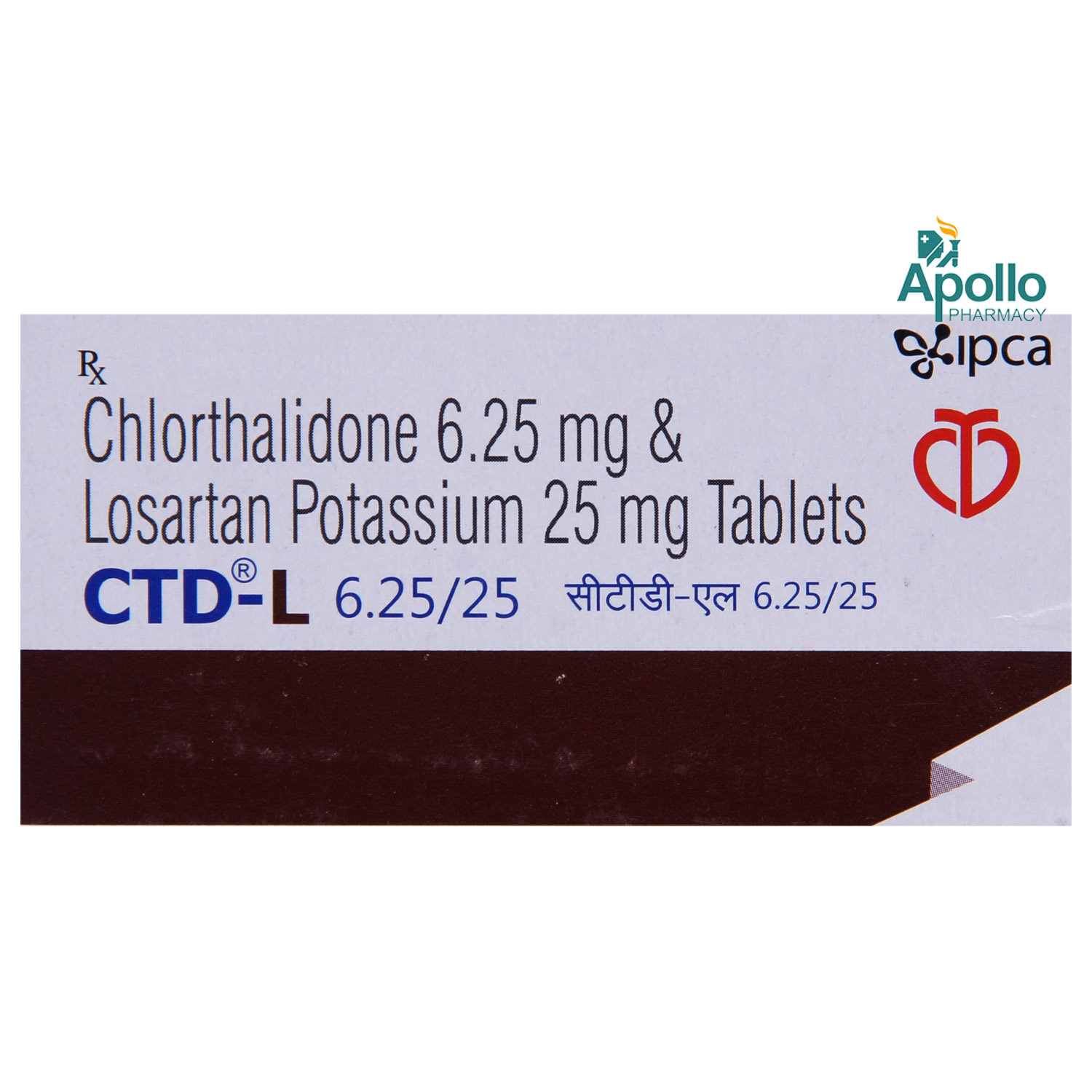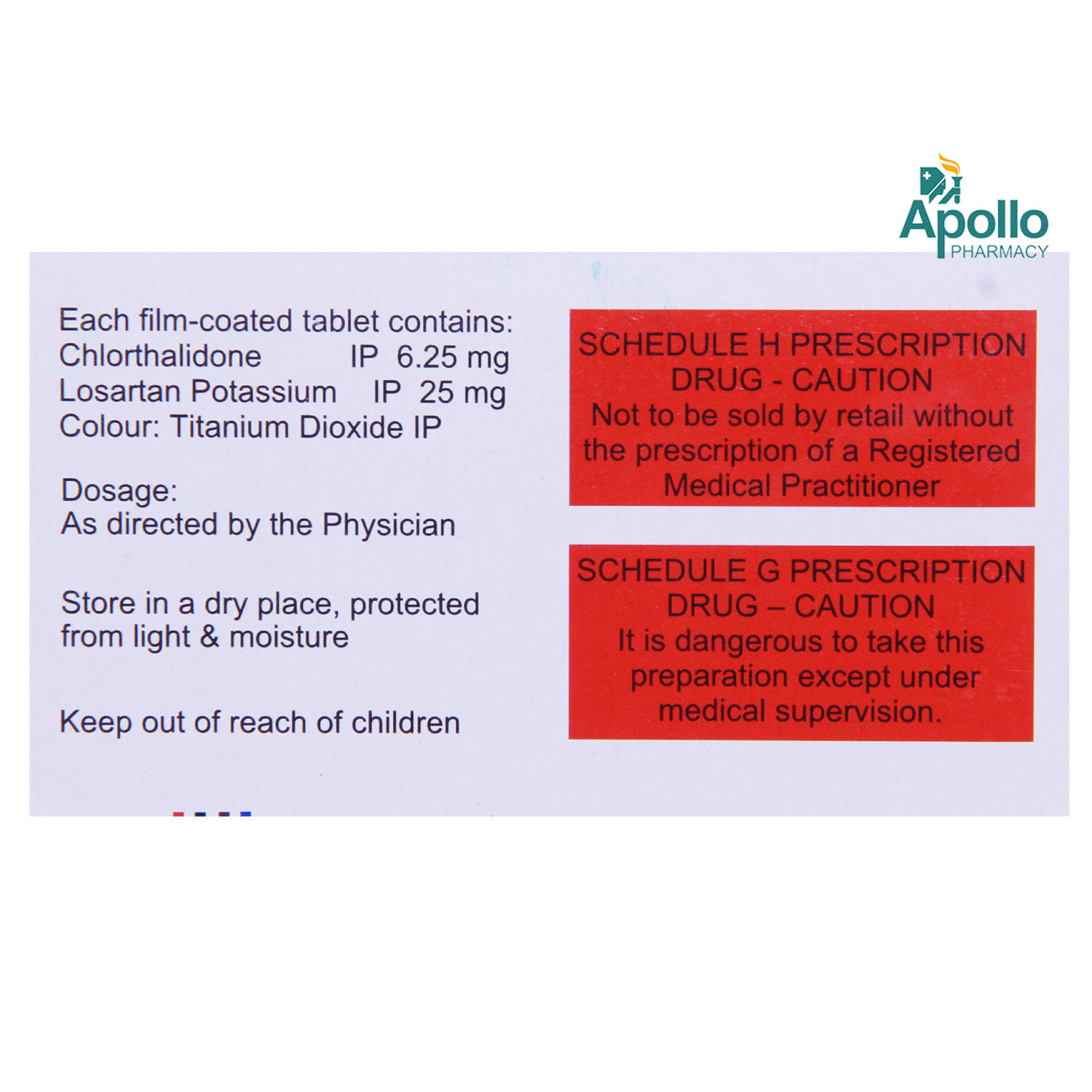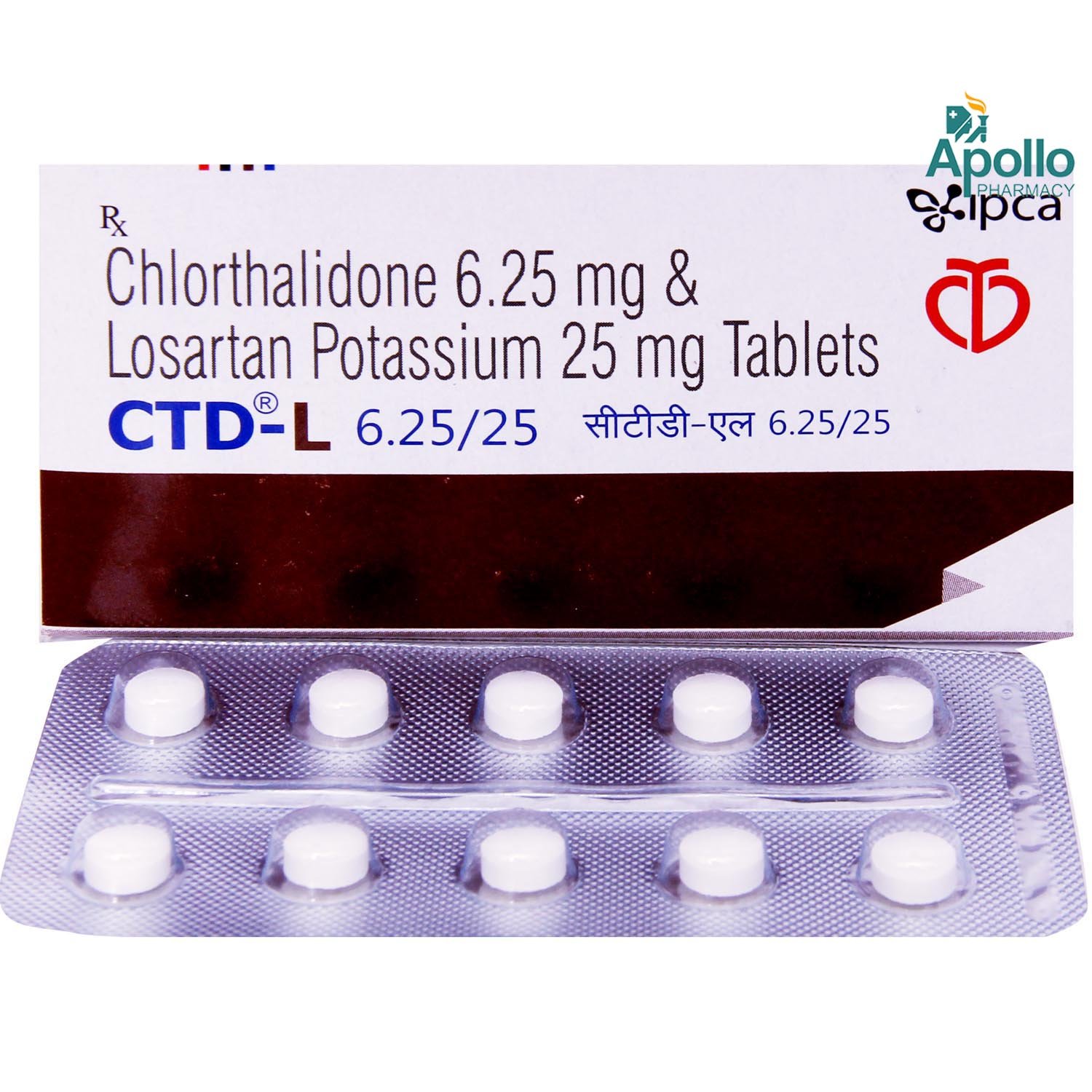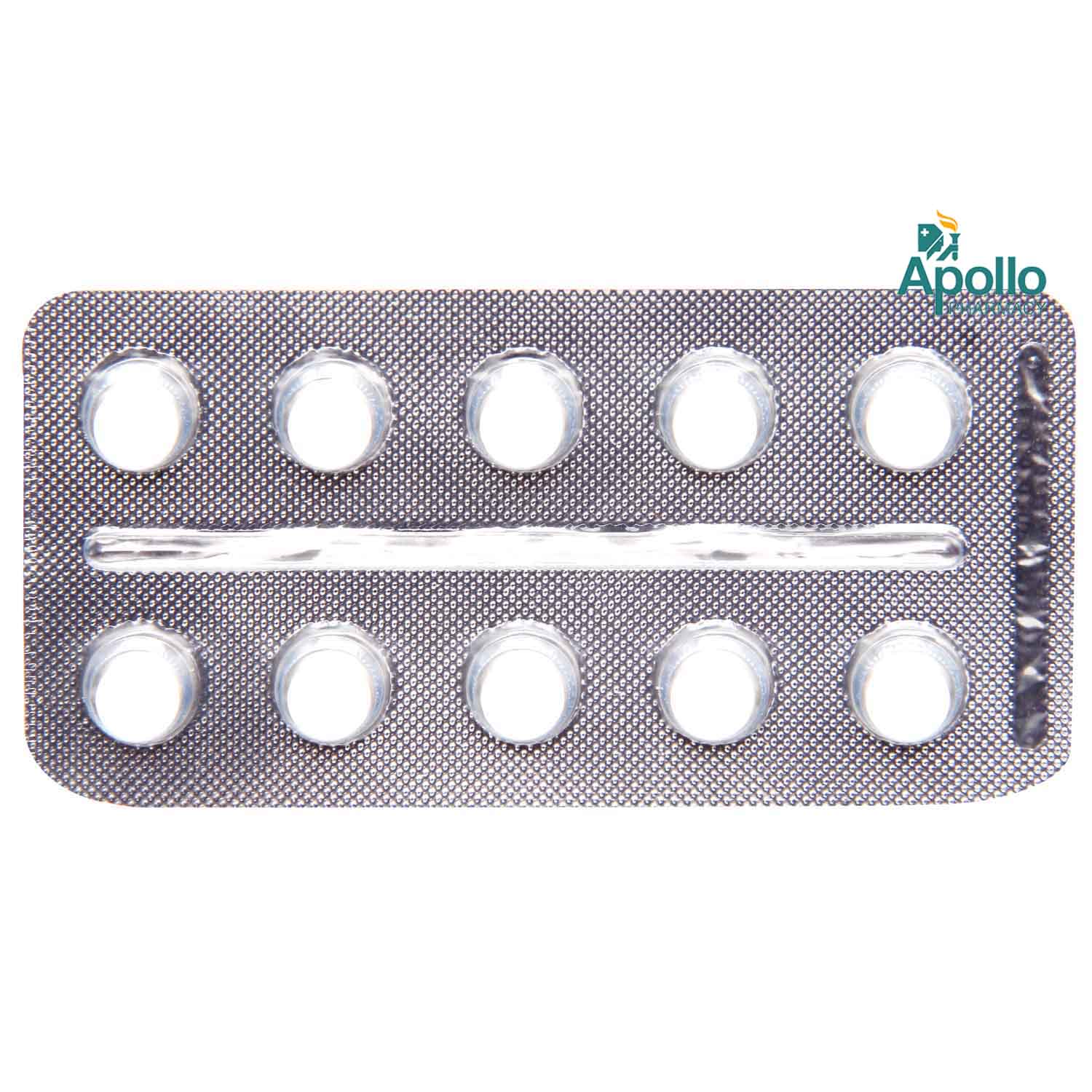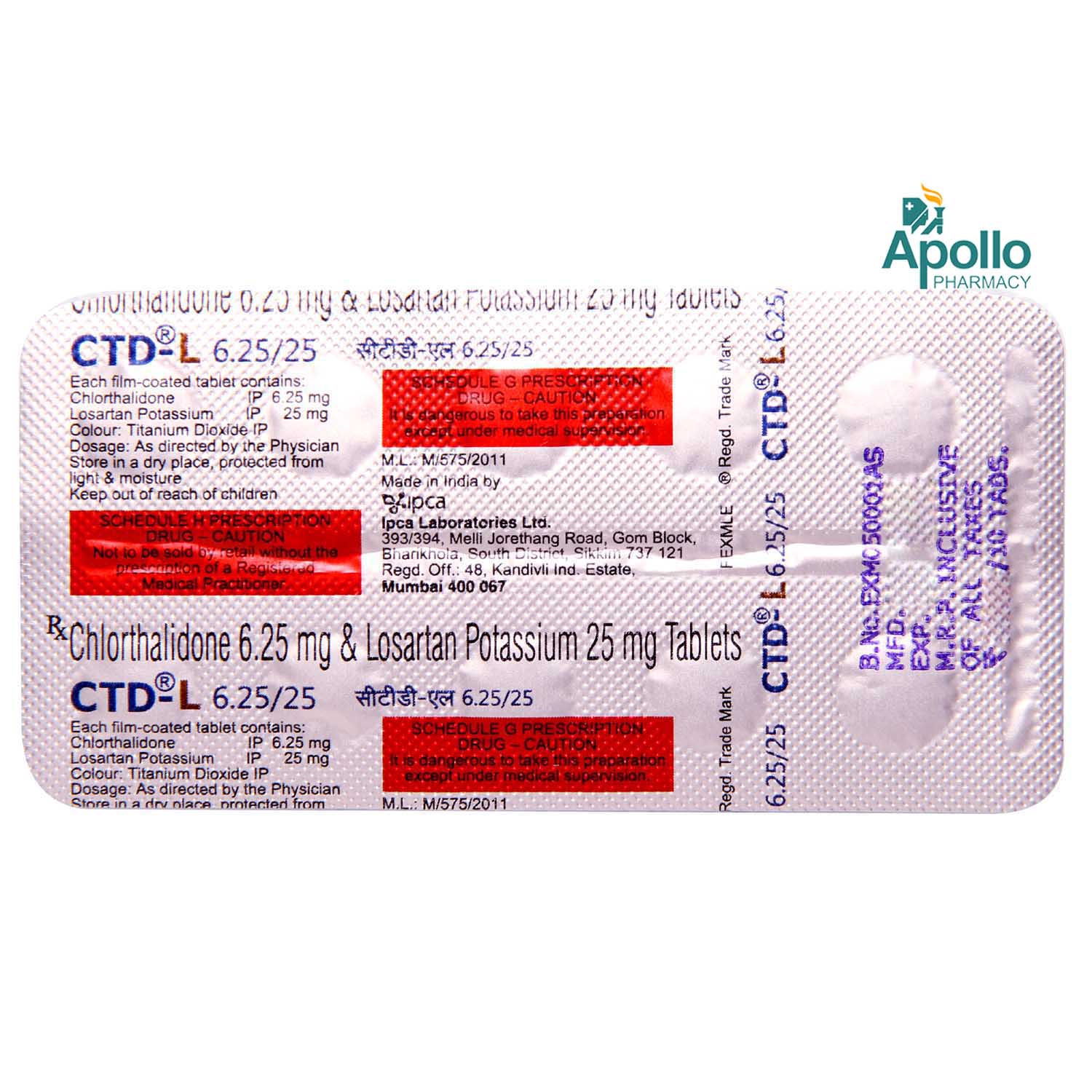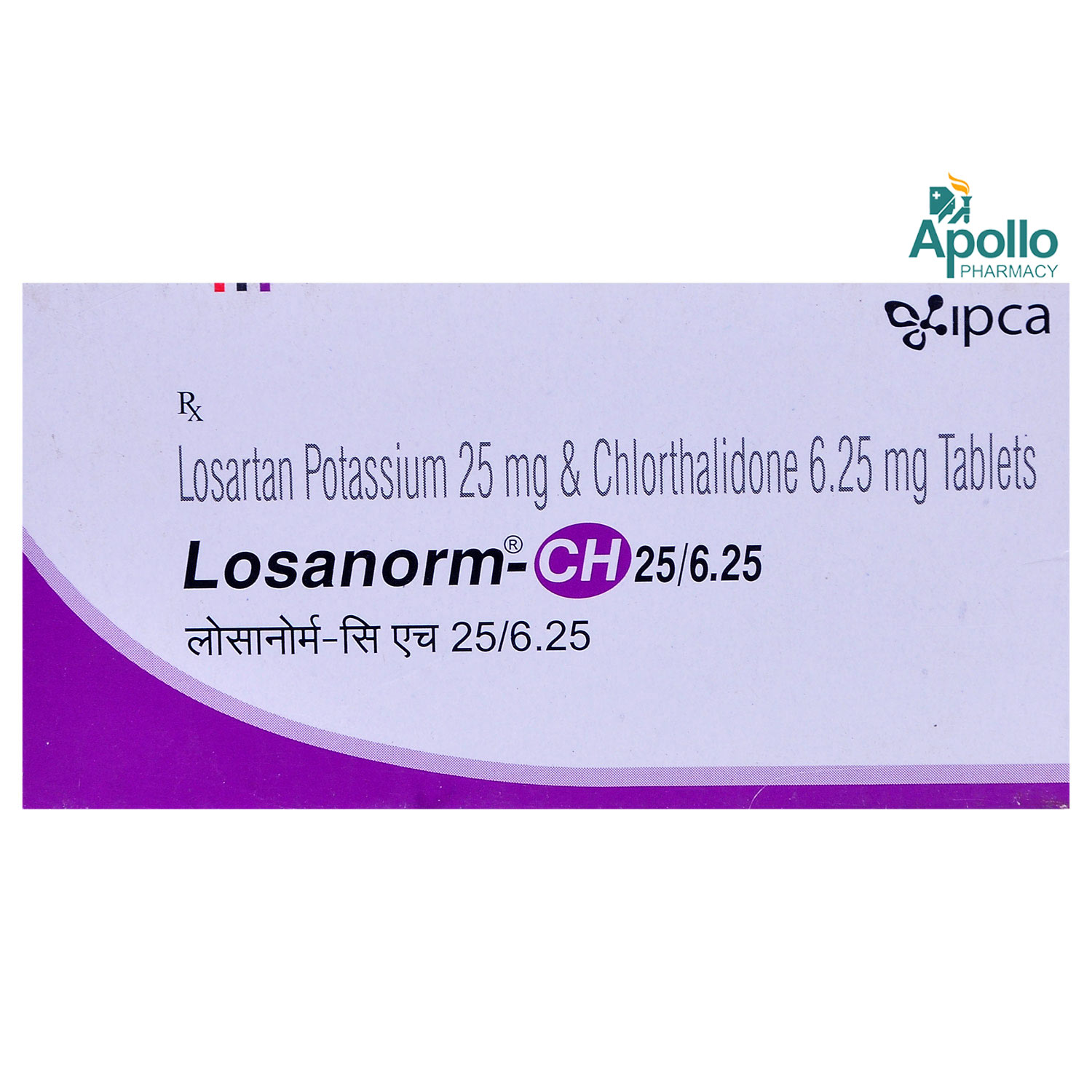CTD-L Tablet 10's
MRP ₹118.5
(Inclusive of all Taxes)
₹17.8 Cashback (15%)
Provide Delivery Location
Online payment accepted
 Prescription drug
Prescription drugWhats That
Composition :
Manufacturer/Marketer :
Consume Type :
Expires on or after :
Return Policy :
About CTD-L Tablet
CTD-L Tablet belongs to the class of ‘anti-hypertensive drugs’ primarily used to treat high blood pressure (hypertension). Hypertension is a medical condition in which blood pressure is elevated persistently in the arteries. It is considered an essential risk factor for cardiovascular diseases like heart attack, stroke, myocardial infarction etc.
CTD-L Tablet consists of two medicines, namely: Losartan and Chlorthalidone. Losartan belongs to a group of angiotensin II receptor antagonists which narrows constricted blood vessels and widens it. Thus, it lowers elevated blood pressure and increases blood flow by preventing blood vessel narrowing. Chlorthalidone belongs to thiazide diuretics (water pill) which inhibits sodium and chloride reabsorption from absorbing excess salts that cause fluid retention or build-up. Thus, it also relaxes the blood vessels to improve blood circulation and lowers raised blood pressure.
Your doctor will decide the dosage of CTD-L Tablet based on your medical condition. In some cases, CTD-L Tablet can cause side effects like nausea, taste changes, stomach upset, diarrhoea, headache, weakness, dizziness and decreased blood pressure. Most of these side effects of CTD-L Tablet do not require medical attention and gradually resolve over time. However, if these side effects persist longer, please consult your doctor.
If you are known to be allergic to CTD-L Tablet or any other medicines, please inform your doctor. Before taking CTD-L Tablet , let your doctor know if you have any kidney, liver problems or severe dehydration. Pregnant and breastfeeding women should consult their doctor before taking CTD-L Tablet . Please do not stop taking CTD-L Tablet on your own, leading to the recurrence of symptoms or worsening the condition. Do not consume alcohol with CTD-L Tablet as it may increase the risk of low blood pressure. Avoid driving or operating machinery if you experience dizziness.
Uses of CTD-L Tablet
Directions for Use
Key Benefits
CTD-L Tablet is an anti-hypertensive medication that treats high blood pressure (hypertension). It consists of Losartan and Chlorthalidone. Losartan is an angiotensin II receptor antagonist. It lowers the blood pressure and increases the blood flow by inhibiting angiotensin (a hormone that constricts blood vessels). Losartan is also used to treat stroke and slow down kidney damage in people with type 2 diabetes. It also increases urinary flow rate and aids in the excretion of electrolytes like chloride, magnesium, calcium and phosphate and by-products like uric acid. Chlorthalidone is a thiazide diuretic (water pill) with antihypertensive activity. It inhibits sodium and chloride reabsorption from absorbing excess salts that cause fluid retention or build-up. Chlorthalidone lowers blood pressure by decreasing the amount of blood the heart pumps (cardiac output) and reducing plasma and extracellular fluid volume (body fluids outside the cells).
Storage
- Talk to your doctor about oral potassium supplements.
- Eat potassium rich foods such as bananas, avocados, oranges, dark leafy greens, beans and peas, fish, spinach, milk and tomatoes.
- Limit intake of full-fat dairy products, red meat and processed foods rich in saturated fats.
- Avoid foods with label “partially hydrogenated oils”.
- Eat more vegetables, fruits, oats, whole grains, lentils and beans to increase fiber intake.
- Include foods rich in monounsaturated fats like nuts, avocados, olive oil, and oily fish.
- Limit consumption of egg yolks.
- Exercise for at least 30 minutes 5 days a week.
- Aim for weight loss and maintain healthy weight.
- Quit smoking as smoking raises the risk of heart disease associated with cholesterol.
- Limit alcohol consumption as excessive drinking may raise cholesterol levels.
- Confusion is a major psychotic disorder that needs immediate medical attention.
- Acknowledge your experience and put effort to control confusion.
- Avoid smoking and alcohol intake as it can worsen the condition and increase your confusion.
- Practice meditation and yoga to avoid anxiety, which can be one of the leading causes.
- Talk to your dietician and consume food that can improve your mental health.
- A blocked nose can be relieved by drinking more water, which helps clear fluids.
- Use saline nasal spray available over the counter to relieve blockage or blow harder to remove the mucus.
- Use nasal strips that can be placed on the nose to widen nostrils and increase airflow.
- Keep a humidifier around to moisten air at home/workplace.
Drug Warnings
Complete the course strictly as suggested by the doctor, even if you feel better, to avoid disease recurrence. Let your doctor know if you have any history of heart, kidney or liver diseases, severe dehydration, high potassium levels (hyperkalaemia), low potassium levels (hypokalaemia), diabetes, high cholesterol levels, electrolyte imbalance, asthma, lupus (an autoimmune disease), gout and thyroid disorders before starting CTD-L Tablet . Pregnant women should consult their doctor before taking CTD-L Tablet . Chlorthalidone in CTD-L Tablet passes into the breast milk during breastfeeding. Hence, it is advised to inform your doctor before using CTD-L Tablet if you are a nursing mother. Avoid operating any machines or doing any work that needs mental alertness if you feel dizzy after taking CTD-L Tablet . It is advised to avoid alcohol consumption while using CTD-L Tablet to prevent dizziness and risk of low blood pressure. CTD-L Tablet is not recommended for use in patients younger than 18 years of age.
Drug-Drug Interactions
Drug-Drug Interactions
Login/Sign Up
Co-administration of CTD-L Tablet and cisapride may increase the risk or severity of an irregular heart rhythm that may be serious.
How to manage the interaction:
Taking CTD-L Tablet with Cisapride is not recommended, please consult your doctor before taking it. Do not discontinue the medication without consulting a doctor.
Co-administration of CTD-L Tablet with pimozide can increase the risk of an irregular heart rhythm that may be serious.
How to manage the interaction:
Although there is an interaction, CTD-L Tablet can be taken with pimozide if prescribed by the doctor. Consult the prescriber if you develop sudden dizziness, lightheadedness, fainting, or fast or pounding heartbeats during treatment with pimozide. Also, let the doctor know if you experience signs of electrolyte disturbance, such as weakness, tiredness, drowsiness, confusion, muscle pain, cramps, dizziness, nausea, or vomiting. Do not discontinue any medications without consulting a doctor.
Co-administration of Aminolevulinic acid and CTD-L Tablet may increase the risk of severe sunburn.
How to manage the interaction:
Taking CTD-L Tablet with Aminolevulinic acid together can possibly result in an interaction, but it can be taken if a doctor has advised it. If you notice that your skin is very sensitive to sunlight or if you have a really bad sunburn, it's important to contact your doctor right away. Do not discontinue any medications without consulting a doctor.
Co-administration of CTD-L Tablet with ziprasidone can increase the risk of an irregular heart rhythm that may be serious.
How to manage the interaction:
Although there is an interaction, CTD-L Tablet can be taken with ziprasidone if prescribed by the doctor. but it can be taken together if prescribed by a doctor. However, consult your doctor if you experience sudden dizziness, lightheadedness, fainting, shortness of breath, weakness, tiredness, drowsiness, confusion, muscle pain, cramps, nausea, or vomiting. Do not discontinue any medications without consulting a doctor.
Taking Droperidol can make CTD-L Tablet less effective in lowering blood pressure.
How to manage the interaction:
Taking CTD-L Tablet with Droperidol together can possibly result in an interaction, but it can be taken if your doctor has advised it. If you have any of these symptoms, it's important to contact your doctor right away. These symptoms include an irregular heart rhythm, severe or long-lasting diarrhea or vomiting, complications, sudden dizziness or lightheadedness, fainting, difficulty breathing, heart palpitations, weakness, feeling sleepy or confused, muscle pain, and feeling nauseous or vomiting. Do not stop using any medications without first talking to your doctor.
Co-administration of CTD-L Tablet together with lithium can increase the effects of lithium.
How to manage the interaction:
Although there is a interaction between CTD-L Tablet and lithium, but it can be taken together if prescribed by a doctor. However, consult your doctor if you experience diarrhea, vomiting, drowsiness, shaking of hands and legs, thirst, increased urination, lack of coordination, or muscle weakness. Do not discontinue any medications without consulting a doctor.
Taking CTD-L Tablet can make the body eliminate Arsenic trioxide faster, leading to lower levels in the blood and potentially reducing its effectiveness.
How to manage the interaction:
Co-administration of CTD-L Tablet with Arsenic trioxide can possibly result in an interaction, but it can be taken if a doctor has advised it. If you have any of these symptoms, it's important to contact a doctor right away: your heart beating irregularly, feeling dizzy or lightheaded, fainting, having a fast or pounding heartbeat, feeling weak or drowsy, being confused, experiencing muscle pain, or feeling nauseous or vomiting. Do not discontinue any medications without consulting a doctor.
Coadministration of CTD-L Tablet with amiodarone may increase the risk of abnormal heart rhythms.
How to manage the interaction:
Although taking CTD-L Tablet with amiodarone may cause an interaction, it is safe to do so if your doctor has prescribed it. If you have a cardiac problem or electrolyte imbalances, you may be more vulnerable. If you develop sudden dizziness, lightheadedness, fainting, shortness of breath, or a rapid heartbeat, consult a doctor. Do not stop taking any medications without visiting a doctor.
Co-administration of Tizanidine and CTD-L Tablet may show additive effects and increase the risk of low blood pressure.
How to manage the interaction:
Although there is an interaction, CTD-L Tablet can be taken with tizanidine if prescribed by the doctor. If you experience headache, dizziness, palpitations, or sweating, contact your doctor immediately. Do not discontinue any medications without consulting a doctor.
Coadministration of ramipril together with CTD-L Tablet may increase the risk of side effects such as low blood pressure, kidney function impairment, and a condition called hyperkalemia (high blood potassium).
How to manage the interaction:
Taking CTD-L Tablet with Ramipril together can result in an interaction, it can be taken if your doctor has advised it. However, if you notice any nausea, vomiting, weakness, confusion, tingling of the hands and feet, feelings of heaviness in the legs, or irregular heartbeat, you should contact a doctor immediately. Avoid taking a potassium-rich diet (tomatoes, raisins, figs, potatoes, lima beans, bananas, plantains, papayas, pears, cantaloupes, mangoes) while taking these medications. Do not stop using any medications without talking to a doctor.
Drug-Food Interactions
Drug-Food Interactions
Login/Sign Up
Diet & Lifestyle Advise
- Keep your weight under control with body mass index (BMI) between 19.5 and 24.9.
- Do regular physical activity or exercise for at least 150 minutes per week, or about 30 minutes most days of the week. Doing this can help you to lower your raised blood pressure by about 5 mm of Hg.
- Limit sodium chloride intake (table salt) in your daily diet to 2300 mg per day or less than 1500 mg is ideal for most adults.
- If you are taking alcohol, use only one serving for women and two servings for men.
- Quit smoking to lower the risk of heart diseases.
- Avoid chronic stress as it can raise your blood pressure. Try to enjoy and spent time with your loved ones to cope with stress.
- Monitor your blood pressure daily, and if you notice any fluctuations frequently, please contact your doctor immediately.
- Try including heart-healthy omega 3 fatty acid-containing foods in your daily diet. You can also use low-fat cooking oils like olive oil, soybean oil, canola oil, and coconut oil to lower your elevated blood pressure.
Side Effects of CTD-L Tablet
- Nausea
- Taste changes
- Stomach upset
- Diarrhoea
- Headache
- Weakness
- Dizziness
- Decreased blood pressure (hypotension)
Habit Forming
Therapeutic Class
All Substitutes & Brand Comparisons
RX
Losanorm-CH 25 mg/6.25 mg Tablet 10's
Ipca Laboratories Ltd
₹102.5
(₹9.23 per unit)
13% CHEAPER
Author Details
We provide you with authentic, trustworthy and relevant information
Drug-Diseases Interactions
Drug-Diseases Interactions
Login/Sign Up
FAQs
CTD-L Tablet works by relaxing and widening the blood vessels to make the heart pump blood easily throughout the body and also prevents fluid retention due to excess salts build-up, thereby lowering the raised blood pressure.
CTD-L Tablet can make you feel dizzy. Dizziness usually occurs when you suddenly stand up from a lying or sitting position. Try rising slowly when you change your posture to relieve dizziness. If the side effect persists longer, please seek medical help.
CTD-L Tablet can cause high levels of potassium in the blood leading to hyperkalaemia. Hence it is not recommended to use potassium supplements along with CTD-L Tablet . However, consult your doctor if you are already taking other medicines before starting CTD-L Tablet .
Chlorthalidone in CTD-L Tablet may affect blood sugar levels in people with diabetes. Hence, it is advised to monitor your sugar levels while taking CTD-L Tablet regularly. Your doctor may adjust the dose accordingly. Please seek medical advice for more information before starting CTD-L Tablet .
Even though your blood pressure becomes normal after using CTD-L Tablet , it may switch back to high ranges if you stop using it. Your doctor may change the dosing schedule based on your blood pressure range.
CTD-L Tablet can cause dehydration. It is advised to drink plenty of fluids and avoid hard exercises and sports to prevent dehydration. If you experience extreme thirst and dry mouth for a longer period, please seek medical advice.
Drug-Drug Interactions Checker List
- LISINOPRIL
- BENAZEPRIL
- ALISKIREN
- IBUPROFEN
- NAPROXEN
- DOFETILIDE
- DROSPIRENONE
- CISAPRIDE
- LITHIUM
Special Advise
- Keep a check on your daily blood pressure, and if you notice any fluctuations, please consult a doctor. Low salt/sodium diet and regular exercise are recommended along with CTD-L Tablet for effective results.
- Thiazide diuretics like Chlorthalidone may increase serum triglyceride and cholesterol levels. Hence it is advised to monitor your cholesterol levels regularly.
- Chlorthalidone in CTD-L Tablet may interfere with specific lab tests like parathyroid test and protein-bound iodide test, hence mention that you are using CTD-L Tablet in advance to the laboratory staff.
- Your doctor may advise you to get a regular kidney function test, blood examinations for potassium levels and other electrolytes while using CTD-L Tablet to rule out any renal impairment.
- Regular monitoring of blood glucose levels is advised in diabetic patients while using CTD-L Tablet .
Disease/Condition Glossary
Hypertension: It is a chronic condition when blood pressure is too high. Blood pressure is defined as the amount of blood pumped by the heart and the amount of resistance exerted by the arteries against the blood flow. If the heart pumps more blood, then arteries become narrower, and in turn, blood pressure becomes high. If blood pressure becomes uncontrolled, it may lead to serious heart diseases, including stroke and heart attack. Additionally, high blood pressure can also cause brain damage (stroke), and kidney failure. Blood pressure is expressed as systolic and diastolic pressures. Systolic blood pressure represents the contraction and relaxation of the heart. Diastolic pressure is exerted in the blood vessels when the heart beats and is in the resting state. Ideal blood pressure should be between 90/60mmHg and 120/80mmHg. Hypertension is detected when systolic blood pressure is more than 140mmHg, and diastolic pressure is higher than 90mmHg. Some of the symptoms of hypertension include headache, nose bleed, vomiting, and chest pain.

Have a query?
Alcohol
Safe if prescribed
It is unsafe to consume alcohol, since alcohol consumption with CTD-L Tablet may increase the risk of low blood pressure and cause adverse effects, such as dizziness, fainting, light-headedness, or headache.
Pregnancy
Consult your doctor
CTD-L Tablet is not recommended during pregnancy since it may affect and harm the baby. Consult your doctor before taking CTD-L Tablet if you plan to become pregnant or already pregnant. Your doctor will weigh the potential risks and benefits before prescribing CTD-L Tablet .
Breast Feeding
Consult your doctor
Chlorthalidone in CTD-L Tablet is not recommended during breastfeeding. Please consult your doctor before taking CTD-L Tablet if you are breastfeeding.
Driving
Safe if prescribed
CTD-L Tablet may cause side effects like dizziness or tiredness, which can affect your ability to concentrate and drive. Hence, it is recommended not to drive or operate machinery until you are mentally alert.
Liver
Consult your doctor
Let your doctor know if you have any history of liver diseases before taking CTD-L Tablet . The dosage will be initiated in lower doses and will be further adjusted in patients with liver diseases.
Kidney
Consult your doctor
CTD-L Tablet consists of Losartan drug, which may affect the kidney functioning. Hence it is advised to seek doctor advice before starting CTD-L Tablet if you have kidney problems.
Children
Safe if prescribed
Safety and efficacy of CTD-L Tablet have not been established in patients younger than 18 years.

